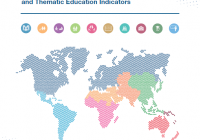The UIS works with about 200 countries and territories to produce the most comprehensive and trusted global education database. The quality of these indicators depends on the data provided by line ministries (especially education ministries) and national statistical offices.
Capacity development is a cross-cutting priority for the UIS. We provide a range of tools and services to help countries strengthen every phase in the cycle of data production. To do this, we work directly with the people producing the data – statisticians – and those using the data for education policymaking and planning.
National Capacities for Better Data
By working directly with national authorities and development partners, we help countries to:
Developed by countries with UIS support, each NSDES provides national authorities with a sector-wide vision to improve education statistics, while also serving as a roadmap to help donors target their related initiatives and support.
The UIS also produces a wide range of methodological resources, guidelines and classifications to help countries produce internationally-comparable data. This is all part of the UIS mandate to help countries produce and use high-quality data to inform their policies and planning, while monitoring progress towards their goals.
For example, the UIS is working with ten countries to bridge the gap between data and policy in the localisation of Sustainable Development Goal 4 (SDG 4) through UNESCO’s Capacity Development for Education Programme. These countries are leading the way in developing and testing a new set of tools to improve the quality and use of their national data, while applying international standards to report the datafor global monitoring.
This collaborative approach underlies all of our capacity-building projects. For example, many countries do not have the data needed to track total education spending, including the contributions of households, non-governmental organizations and different levels of government. In response, the Institute works directly with countries to compile education expenditure data through an annual survey, while providing them with tools to improve their statistical systems and adopt frameworks, such as the National Education Account (NEA).
While offering a wide range of methodological tools and resources, the UIS also helps countries implement them through training workshops and technical assistance offered at the regional and national levels when resources permit. For example, the Institute is working with regional partners in the Pacific to help 15 Small Island Developing States to assess and improve the quality and availability of their education data.
The UIS is also helping countries respond to the demand for new types of indicators emerging with the SDG 4–Education 2030 Agenda through global initiatives such as the:
